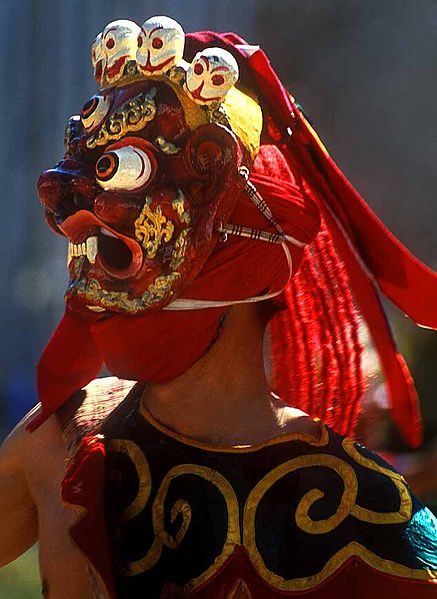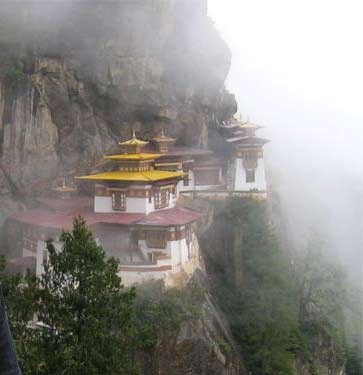
Tantric Buddhist religious dance image courtesy Steve Evans
The choiceless mode of relating to meaningness has no “becauses.” In the systematic mode, when you ask “why,” a system answers “because…”. The “becauses” hang together in ways that make everything make sense. In the choiceless, or pre-systematic mode, that’s not necessary—or even conceivable.
In the choiceless mode, you know of only one way of understanding meaningness. You are unaware of any alternatives. In fact, you are also unaware of your own understanding; of the possibility of alternatives; and of your lack of awareness.
In a choiceless culture, no one asks “why?” about meanings, and so there is no “because” needed to answer. Asking doesn’t occur to you. Meaning is a given: inherent in people and things. Water rats are tasty; there’s no point asking why. You marry your mother’s brother’s daughter; to marry your father’s brother’s daughter would be an abomination; you do not think to ask why.
In a choiceless society, you are defined by your social position. You are the son of so-and-so, and belong to the eagle clan—as your father, the clan chief, did. When he died, your elder brother wore the eagle clan hat at the wake. If your brother dies before you, you will wear the clan hat. Like all eagles, you are an enemy of the horse clan and allied to the bear clan. You knew from the age of five that you would marry your mother’s brother’s daughter. This is your self; this is who you are.
In a choiceless culture, art follows forms handed down through legitimate peripheral participation plus some oral explanation. The forms are unquestioned; they are simply as they are. Making art (in the broad sense—music, stories, clothing) is a communal activity. There is no sense of authorship, or originality as a value.
All of this is just how it is; there is no “because” available.
Of course, pesky children and anthropologists do ask “why?”. If they are persistent, they’ll get some story that makes no sense. Answers in choiceless societies follow dream logic, not pragmatic logic. Typically they involve biologically-impossible sex acts, a flying buffalo-woman, or a talking snake in a magic fruit tree.
In choiceless cultures, meaningness is not a problem. You may have a problem, because you loathe the cousin you have to marry, but that’s just practical. It’s a fact you have to live with, like the permanent limp you got with an ankle broken when you were a kid. It does not occur to you to blame the system, because you have no concept of systems.
Meaning in choiceless societies seems timeless and changeless. Particular meanings can and do change, but within the culture this is noticed only as specific, local, contingent changes, rather than as a general dynamic. There is little sense of history; of change beyond that experienced during one’s life, and in one’s community.
Many social scientists use the word “traditional” to mean what I’m calling “choiceless.” However, “traditional” is also used to mean entirely other things,1 so I’ve invented the new term to avoid ambiguity.
A partial experience of choicelessness

Image of Tantric Buddhist temple courtesy Michael Reeve
The choiceless mode is the most natural one. Nearly all humans who have ever lived have only experienced meaning in the choiceless mode. Our brains co-evolved with choicelessness, and it feels right. All the other modes feel wrong. So Meaningness and Time is about why the other modes—despite all their genuine benefits—make us unhappy, and what to do about that.
Unfortunately, the choiceless mode depends on ignorance of alternatives. It’s usually impossible for nearly everyone in the developed world, and survives mostly only in remote areas in the most “backward” countries.
In 2003, I spent a month on pilgrimage in the Himalayan backcountry; one of the poorest and most remote places in the world. I went to practice my religion, Tantric Buddhism, with people for whom it is the normal way of life. In that, I was naive and mainly disappointed. As with notional Buddhists everywhere in Asia, few people were aware of even the most basic Buddhist doctrines or practices, and almost no one had Buddhist motivations.2
Yet my month there was probably the happiest of my life. What I found instead was a sane, optimistic, decent society, that felt right to me, and I believe also to most people in it. Presumably part of that rightness was religious commonality. A Catholic might feel something similar on pilgrimage to Santiago de Compostela. I don’t think that commonality was the main thing, though.
I would like to believe that Buddhism is a particularly good religion, and this was a good place with good people partly due to its Buddhist history—even if there is not much Buddhism now. At the time, I wrote:
Whatever their experience of religion, it seems to have a very salutary effect on their character. It has been remarked by visitors here for hundreds of years that they are exceptionally honest, hard-working, considerate, sensible, polite, reserved, hospitable and decent; it is hard to resist summing this up as “noble.”
I think, though, that the quasi-Buddhist content of the culture may have been less important than that it was a rare survival of the choiceless mode. The people had an intact social order, with ritual roles that everyone understood thoroughly and accepted without question.
Yesterday I took part in a procession (splendid costumes, trumpets and cymbals, deity and sword dance, fire offering) in which lots of old people were counting Guru Rinpoche mantra. So I pulled out my rosary and practiced mantra too. This got lots of amused looks (politely hidden, except in the case of small children). Norbu said today that he had overheard conversation and in fact everyone was excited and happy to see a white Buddhist; they had never seen one before. Maybe I should practice in public more often.
My own experience was one of choicelessness, too, or as much as I’ve ever had. At a literal, practical level, there were almost no decisions I could make. I knew only a few dozen words of the language, so I was dependent on the translator and organizer of the pilgrimage. Experientially, I was wide-open due to the combination of culture shock and intensive meditation practice:
Sometimes I find myself in an a situation that is clearly not me, with no explanation for how this could have happened, producing a sense of surreal dislocation. For example, a month ago I found myself working as an unpaid waiter in the restaurant attached to a Hindu temple in Malaysia, due presumably to some causal chain that I could not begin to reconstruct. My ability to laugh and ecstatically go with such situations (“I’ve no clue why how or why am I here, nor do I have the foggiest idea how to be a waiter in general, much less in a Malaysian Hindu temple restaurant, but I will do the absolute best job I can and enjoy it thoroughly, because why not”) seems to be the best measure of my health at the level of energy.
Here the most important religious practice in an individual’s life is the Annual Ritual. This is a house-and-family-blessing ritual. A crew of monks are hired to provide the requisite clangs, blaats, and hocus-pocus3 in the house’s shrine room (every house has one). While they are in there performing the ritual, the head of household participates in a small way. Mostly, however, the Annual Ritual is an excuse to invite all your friends and extended family over for some serious drinking (in the rest of the house). Exactly how this can be the most important religious practice in an individual’s life, I don’t understand, since the practice seems to be done by the monks almost exclusively. This is part of the general paradox that everyday life here is thoroughly infused with religious practice, and yet in a sense they don’t seem to practice at all. (They pay monks to do it for them.)
Anyway, yesterday I found myself inexplicably in the shrine room of a house undergoing Annual Ritual, helping the monks. Mostly they knew the liturgy by heart, which I didn’t, and there was no spare copy of the text, and in any case I can’t read Tibetan fast enough to keep up. So my participation was mostly restricted to throwing rice at appropriate moments, and joining in on the very occasional bits of liturgy I recognized (such as Guru Rinpoche mantra).
At the end of the pilgrimage, I concluded:
I’ve gained significant new insight into what makes me happy and miserable; and, relatedly, into the nature of my energy problem. Briefly, in managing a business, I learned to divide my energy finely, and to send out the fragments of my being to animate all the minute details of a complex enterprise—leaving as little as I possibly could within my own body. Over the years this became a habit, and one that has been difficult to unlearn. Here, I have been entirely cut off from “the world” and its complexities, into which I would habitually discharge my energy. I have instead been surrounded by natural beauty and by the sacred. Practicing perception and nowness, together with some specific energy methods, has drawn my energy back into my body, coherent and undivided. The challenge now will be to make that habitual even when dancing in the charnel ground that is the Western world.
- 1.In postmodernity, conservatives often use “traditional” to mean “modern,” i.e. the way things were until forty years ago. “Traditional” can also mean no more than “we did it that way last time.” As we’ll see, traditions are often back-dated by their inventors, to make them seem non-choices.
- 2.Instead, they practiced “the worldly yana,” a religion of practical benefits.
- 3.Clangs from cymbals, blaats from trumpets, and hocus pocus from religious texts read out loud.
